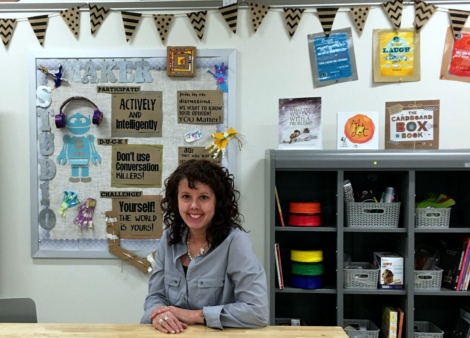
Voice and Choice with CBE of the Month Davey Neill
Posted by Jessica Millstone on
Please welcome February’s Certified BrainPOP Educator of the Month Davey Neill, a teacher at the Shanghai American School in China! In this interview Davey recounts experiences that inspired him to become a teacher, and how he uses the interactive features accessed through his school’s MyBrainPOP account in an international setting.
What grade(s) do you teach? Subject area?
I teach fifth grade math, science, and social studies.
How long have you been teaching?
Fifteen years.
What inspired you to go into education?
Weird story. I had Hodgkin’s Lymphoma as a kid; later, in university, I became a counselor for summer camps run by the Canadian Cancer Society. It was there I discovered a talent for connecting with kids and engaging them at their emotional and intellectual level. Education was a logical step from there.
Which CBE class were you a part of? What do you like about being a CBE?
The Spring 2016 online class, with Andrew Gardner as my guide on the side. What I like most is being the guy in the room that gets to open the BrainPop universe up to others for the first time. BrainPOP is too often overlooked by educators stuck in the notion that it’s just a Flash movie with a 10 question quiz. There are incredible teaching and learning opportunities under the hood of a BrainPOP subscription and sharing this with unwitting others is incredibly gratifying.
What is one of the most memorable projects you’ve done with your class using BrainPOP resources?
There’s one I use called “Jigsaw Potluck”. At the beginning of our school year, our students create their ownBrainPOP accounts with their own login and password. My students, sitting at tables of four, are invited to login and choose one subject area in BrainPOP (science, social studies, math, etc.) according to their interests as a learner. From there, each student picks one topic that they they aren’t familiar with and views a BrainPOP movie of their choice, taking notes along the way. Once finished, we hold a “Jigsaw Potluck” at each table where each student does a turn and talk with the other, sharing with the other students at their table about their new topic. We do a wrap up where we go around the room and have students introduce each other and what they’ve just learned about. It’s a nice icebreaker and allows students to see the power of the platform for themselves.
How has BrainPOP impacted a specific student (or group of students)?
I teach at the Shanghai American School to a wonderfully diverse population of students with equally diverse cultural and language backgrounds. On its own, that’s an amazing part of where I teach, but it presents a unique challenge as many students new to our school come to us with not only as new to English but with limited exposure to American history and culture. This year, in my own fifth grade classroom, we have a trans-disciplinary unit where we explore the major American migrations, good and ill, of the last 500 years. Presented with the challenge of covering a vast swathe of history in a single unit with many learners having little schema to draw from, we came up with a selected set of BrainPOP topics on U.S. history, creating a series of lessons and activities that sequenced the significant events and milestones of the American experience. With its built-in features, kid-friendly content and emphasis on academic language, BrainPOP offers incredible support for my English Language Learners. Beyond its talent as a language support, BrainPOP is a superior front-loading resource, allowing all students to grasp new concepts and develop their own lines of inquiry about topics previously unbeknownst to them.
How has becoming a CBE impacted you?
It hasn’t even been a year but it is the gift that keeps on giving in so many ways. The BrainPOP community of educators is an incredibly talented group of professionals who understand the transformative potential of this platform. I have ardently admired BrainPOP throughout my career as a teacher so connecting with educators around the world who share my enthusiasm for this tool is like finding new friends who share my taste in music. In the process of becoming a CBE, I gained much insight on what BrainPOP offers and how it can be leveraged for best practice in the classroom. It has put tools in my toolbox as a teacher that have had a profound impact on the learning outcomes of my students. Last but certainly not least, I’m honored to have been invited by BrainPOP to co-host a workshop at the 21st Century Learning Conference in Hong Kong this March to help introduce more educators to our growing community.
What are you most passionate about when it comes to education, technology, and your approaches to teaching?
My answer to this question is constantly undergoing revision as it tries to keep pace with new technologies, new pedagogical models and new digital content. That stated, these days, I’m very interested in personalized learning. Learners today have unprecedented access to technologies and supports that were unavailable a generation ago. There’s a democratizing principle inherent to this effort that presents incredible opportunities on the horizon of progressive education. I love the idea that students have voice in their own learning and are increasingly fluent using a suite of digital tools that help them develop agency as lifelong learners.
What’s on your BrainPOP wish list?
As adults, we live in a world where traditional media constantly merges with social media, and for many, ‘the feed’ becomes the primary resource of information on essential topics and issues that truly effect our everyday lives. If recent history has taught us anything, the dynamics of the new media landscape have the ability to both enlighten and obscure our worldview and how we perceive our fellow citizens. Today, for reasons I will not detail in this forum, my wish is for materials and resources that teach students of all ages the fundamentals of what it means to be fluent in 21st century media literacy.














